|
23 January 2005 I often tell people I have an eight-track mind. (Complete with fuzzy recordings of Paul Simon and Rachmaninoff concertos. Umm. That's two separate things, that is; to the best of my knowledge, Paul Simon and Rachmaninoff never collaborated.) Lately it has been reduced to two, and one of them is book revisions. Booooook. Thermionic Night is in need of very large revisions. Sampo will be in need of even larger revisions, but first things first. I have a stack of notecards half an inch thick for Sampo revisions, but that's mostly either stuff that carried over from Thermionic Night or stuff that was jumbled in with the revision notes to Thermionic Night when I thought they were going to be one book. Anyway, it's going well, if by "well" you mean that I'm making lots of needed changes. If by "well" you mean that I'm currently convinced that this is the most brilliant work of fantasy written in the last decade and will certainly find a publisher within 5.2 seconds, fame and fortune immediately to follow...um, no. Not so much. I am not yet convinced that it's a good book, even. I'm just convinced that it's closer to a good book when I went to bed last night than when I woke up yesterday morning, and the same for each of the other days this week. Sometimes that's enough. (I'm not entirely sure that it's a better book in a monotonically increasing way. If you're adding in subplots that will make the book richer in the long-term, it may well be worse when you've only added them in the first ten chapters than when you don't have any at all. But monotonically increasing quality is not strictly required.) So...it's not that I'm not doing other things. It's that other things are almost always accompanied by a background process of, "and then the bit with Tove's funeral will come around again on the guitar!" (There is not, in fact, a guitar.) This week is rather neatly demonstrating the difference between thinking of writing often and thinking of writing near-constantly. A very few things (or mostly people) have been enough to get the brain to themselves. Most of my life is sharing it with the book right now. I don't know if this is generally necessary, but I don't seem to be able to avoid it in this specific case. There's been other good stuff, though. Yesterday we went with Stella and Mike and Roo to Snuffy's Malt Shop (much beloved by the Roo) and the Torytory, which is what he calls the Conservatory. He likes the Torytory a lot, particularly the fish and the frogs and ("Daddy! Dat lady's naked!") the statues. I like the Torytory, too. So all was well. Back at their house, I read him Bread and Jam for Francis (and Mark and I think Francis's parents are kind of sarcastic jerks, "Ohhhhhh, I didn't knoooooow you liked spaghetti!"), and then I raided Stella's bookshelves and came home with a whole bag to borrow and some advance review copies to keep. We don't go there often because of the cat, so I keep reminding myself that I lend Stella books more gradually, that I'm not just siphoning books off her shelves. But oof. That's a big pile in the corner of my desk, what with hers and David's and Pamela's. Spoiled me. Not to mention my Christmas books. Last week at this time, I claimed that geek is not a gendered noun. Columbine, in one of his self-described box-of-random entries, said, I agree. It is a derogatory term, and the majority of those are purely descriptive and not gendered. "Asshole" is not gendered, nor are "moron," "freak," "loser," or "fanatic." Perhaps, in order to make the gender of geeks clear to the casual observer when using this slur, we should append equally nasty gendered terms.
Hmmmmm. So I asked what the positive or neutral term for the same group was, and I got this response, quoted in part: Yes. This is exactly the problem I expected Columbine to have. And the first part of it is the problem I have, with a bit of twist on it: "smart people," for example, is not the same thing as "geeks." There are some very smart people who are not even remotely geeky, and if we are honest, we will admit that we all know some kind of geeky people who aren't nearly as bright as they think they are. Columbine continues: It would be different if "geek" were a purely descriptive label, like "male" or "female" or "Catholic." Mind you, I suppose you can slap extra layers of interpretation onto those too, if you take it into your head to decide that all Catholics are evil or all women do badly at math or some other poppycock. Maybe you think "geek" is purely descriptive, but to me it is still fully loaded. And that's where we diverge. I know some people use the term in a derogatory way, but in my life it's more likely to be fond: "You are such a geek," comes with an implicit "and I would like to hug you now," mostly, in my world. It's been years since I heard someone use the word in a negative way. If there was an alternative that was fully positive to everyone who hears it and still conveyed the same stuff, I'd use it. But in absence of such a term, I think it's our job to put the positive spin on it. Who else will let people know it's okay to be a geek, if not the geeks? Columbine goes on to talk about an X-Men analogy: So, if the geeks are represented by the mutants in this parallel, then ... 1) Wouldn't it be a bad idea for the mutants to call attention to themselves under the circumstances, even if they privately feel it is REALLY GREAT being a mutant? 2) Wouldn't they automatically be suspicious of the term "mutant," as a potentially dangerous word, even if it is applied by someone they know and trust? Yes. This is a perfectly natural reaction. But it is also a perfectly natural reaction, especially for the more obvious mutants, to realize that they weren't going to be anything else, and to deliberately reclaim the term, and to fight back. And to insist that their reality, the reality of being a mutant, is just as real as any other "real world." It's also natural that there would be tension among groups who wanted to hide, groups who wanted to be open but non-threatening and conciliatory, and groups who had blunt instructions for anyone who didn't like their mutation. Considering what else the X-Men have been used as a really, really obvious metaphor for, this seems like a reasonable assessment of how it sometimes works in the real world. If you're not comfortable with being a geek, then of course talking about it is going to be squirmy and uncomfortable, and of course it's going to sound negative. But not talking about it isn't going to make it any better, unless you actually have a way to not be so much of a geek and are willing to pursue that way. I don't have one. I don't want one. Not really a big deal in my life any more. And I no longer feel like geeks have to be a "model minority"; I don't want to hide my name badge at a con if there are Klingons wearing theirs. Everybody has their own associated set of weirdos, and people wearing prosthetic foreheads on their real heads happen to be some of mine. The smelly guy with the nasal voice who can't stop going on about the inconsistency in ship design between book four and book six of his favorite endless series? He's okay with me. I wish he'd wash better, and I don't always want to listen about the ship design, but I don't react like the stereotypical teenager at the mall with her mom, either. There are obnoxious geeks, sure. If you can point me to your community that's entirely free of obnoxious people, go for it, although I think the odds are fairly good that they'll be pretty boring. Most of my favorite people have moments of being a little over-the-top from time to time. It's part of their charm. I think it's easy to feel a lot more persecuted as adults than we actually are. So your mom took away your fantasy novels. Do you live with your mom now? So your high school English teacher told you not to waste your time with that horror crap. Does your high school English teacher stop you at the library circulation desk now? So some of the cheerleaders rolled their eyes when you were president of Math Club. How many of those cheerleaders do you see now, and honestly, didn't you roll your eyes back at their interests, too? High school felt like enough of an eternity at the time; we certainly don't need to stretch it out into the rest of our lives. Sure, there are still people living through it, but they're not going to be any better off if the rest of us huddle inside and try to disavow who and what we are. What's so scary about being a geek? Anyway, anyway. I finally finished Pentikäinen's Kalevala Mythology yesterday, with some notes taken, though it didn't divert the course of the book particularly much. I'm now in the middle of Martha Wells's The Death of the Necromancer, and I'm not sure why I'm not really into the characters, but I'm not. It feels like maybe a misstep from an otherwise good author, or maybe like an author getting her feet, so I'll try a couple of her other books anyway, but I'm really not into The Death of the Necromancer particularly well. (Incidentally, it took me a good while to sort Martha Wells out from Michelle West, because I hadn't read either of their books, and they were fantasy novels shelved close together, and I knew a girl called Michelle Wells in high school. Having read two of Michelle's and now this one of Wells's, I can say they are indeed quite distinct.) And without further ado, here is Roo opening his meeno:
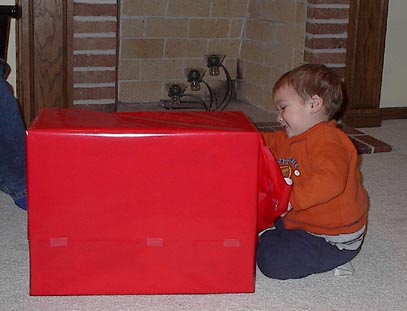
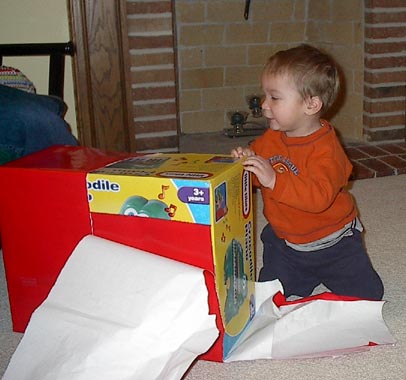 This is the point at which he looked up at me to inquire, "Dis makes noise?" "Yes," I said. He gasped. "It's -- a -- meeno!"
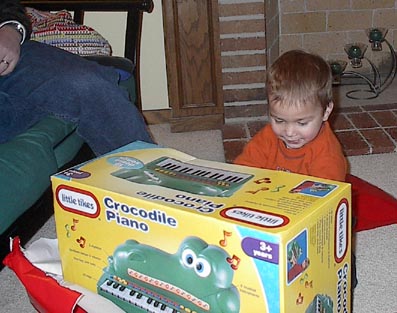 It was too exciting to actually take the meeno out of the box to play it.
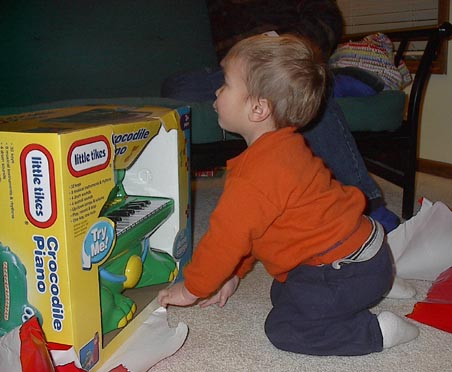 He kept playing it as the grown-ups removed it from the box.
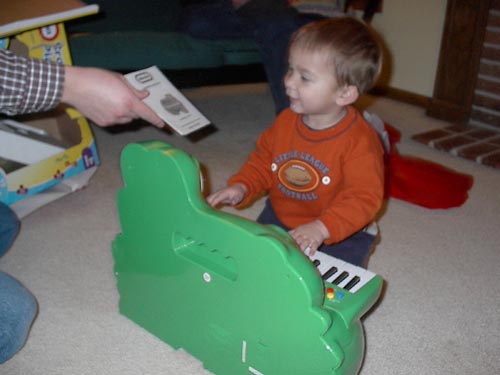 He was not particularly interested in the manual, however.
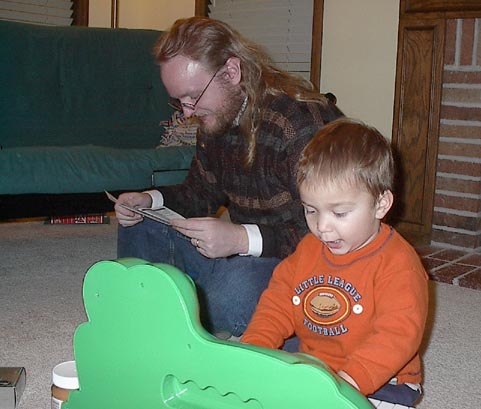 Roo and Uncle Mark serenaded the rest of us with the Hokey Pokey. Roo did most of the serenading, though.
And the main page. Or the last entry. Or the next one. Or even send me email. |